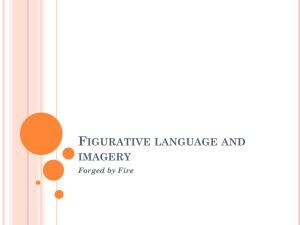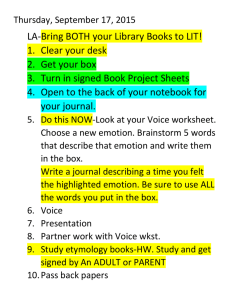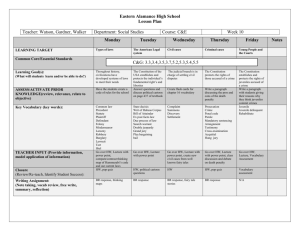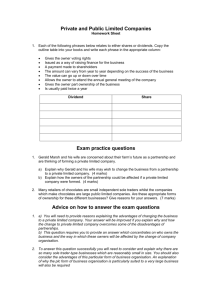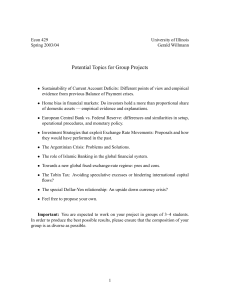Juvenile Rights – Constitution in the Classroom Lesson Summary
advertisement
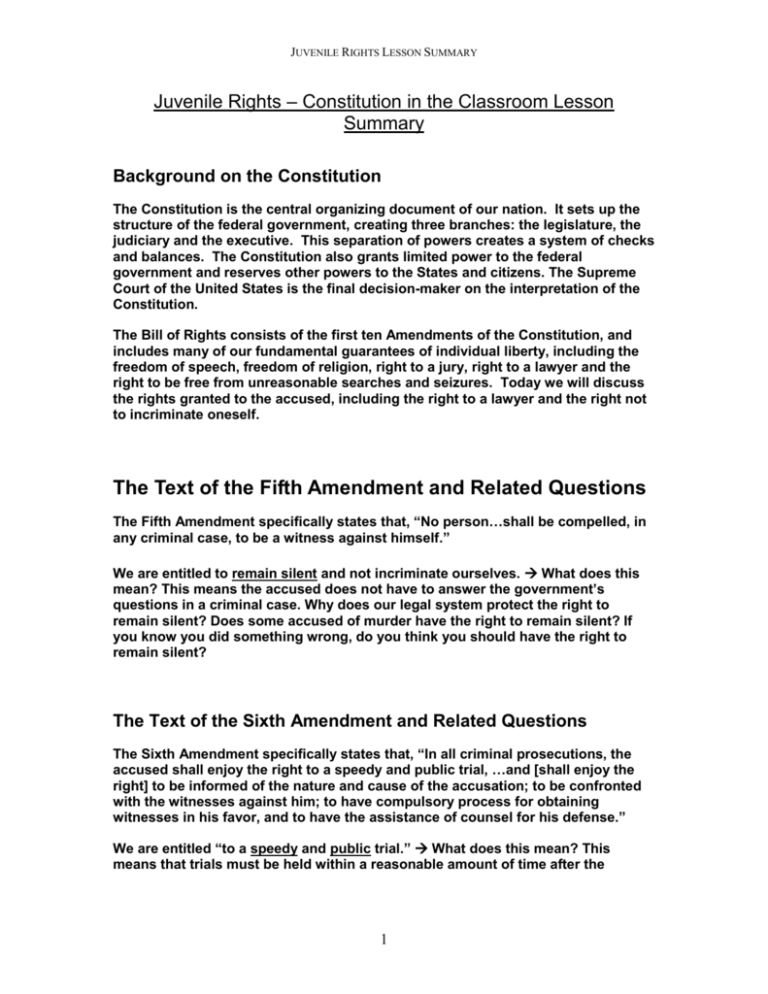
JUVENILE RIGHTS LESSON SUMMARY Juvenile Rights – Constitution in the Classroom Lesson Summary Background on the Constitution The Constitution is the central organizing document of our nation. It sets up the structure of the federal government, creating three branches: the legislature, the judiciary and the executive. This separation of powers creates a system of checks and balances. The Constitution also grants limited power to the federal government and reserves other powers to the States and citizens. The Supreme Court of the United States is the final decision-maker on the interpretation of the Constitution. The Bill of Rights consists of the first ten Amendments of the Constitution, and includes many of our fundamental guarantees of individual liberty, including the freedom of speech, freedom of religion, right to a jury, right to a lawyer and the right to be free from unreasonable searches and seizures. Today we will discuss the rights granted to the accused, including the right to a lawyer and the right not to incriminate oneself. The Text of the Fifth Amendment and Related Questions The Fifth Amendment specifically states that, “No person…shall be compelled, in any criminal case, to be a witness against himself.” We are entitled to remain silent and not incriminate ourselves. What does this mean? This means the accused does not have to answer the government’s questions in a criminal case. Why does our legal system protect the right to remain silent? Does some accused of murder have the right to remain silent? If you know you did something wrong, do you think you should have the right to remain silent? The Text of the Sixth Amendment and Related Questions The Sixth Amendment specifically states that, “In all criminal prosecutions, the accused shall enjoy the right to a speedy and public trial, …and [shall enjoy the right] to be informed of the nature and cause of the accusation; to be confronted with the witnesses against him; to have compulsory process for obtaining witnesses in his favor, and to have the assistance of counsel for his defense.” We are entitled “to a speedy and public trial.” What does this mean? This means that trials must be held within a reasonable amount of time after the 1 JUVENILE RIGHTS LESSON SUMMARY accusation and cannot be held in secret. Why is it important to have a speedy trial? Why is it important to have a public trial? We are entitled to notice “of the nature and cause” of the charge. What does this mean? This means we must be told about what we are being accused of before trial. Why is it important to receive notice of the charges against you? We are entitled to confront the witnesses against us. What does this mean? This means the government is required to present the witnesses who have accused us of a crime and allow us to ask them questions. If the judge has evidence of the crime, does the accused still have the right to confront witnesses? Why is it important to question witnesses? We are entitled to “compulsory process.” What does this mean? This means we are allowed to call witnesses for our defense at trial. Why is this right important? How can a witness for the defense change the outcome of a hearing? We are entitled to “the assistance of counsel.” What does this mean? This means we are provided a free lawyer to help defend our case. What does a lawyer provide that the accused can not do on their own? What happens if the accused cannot afford a lawyer? In Re Gault Excerpt from Youth Justice in America (CQ Press 2005) Gerald Gault was fifteen years old when he found himself in the midst of what became one of the most important legal cases of the 20th Century.i Gerald and a friend were arrested after a female neighbor complained to police about an obscene phone call. Gerald and his friend were suspected of the call. Police took Gerald into custody without telling his parents or informing any family member. He spent the night in the juvenile detention hall. The next day, Gerald appeared before a juvenile judge. He was not represented by a lawyer. At the hearing, no witnesses appeared to testify against Gerald. The state did not provide any notice of the facts about why Gerald was arrested. No record was kept of the testimony. The judge asked Gerald some questions about the phone call. Gerald was never informed of his right to counsel, his right against selfincrimination, or any other rights. Based on Gerald’s answers, the judge ordered a second hearing a week later. Gerald was sent to juvenile hall. At the second hearing, again the female neighbor did not appear. Despite conflicting evidence about Gerald’s role in the phone call, he was found guilty (“delinquent”) and sent to the state juvenile reformatory for six years, until he turned twenty-one. Gerald challenged the constitutionality of these proceedings before the Supreme Court. The Supreme Court agreed that what happened to 2 JUVENILE RIGHTS LESSON SUMMARY Gerald was “fundamentally unfair.” The Court held that certain protections needed to be in place in juvenile delinquency hearings. The Court ruled that at a minimum, juveniles are entitled to assistance of counsel, notice of the charges against them, the right to confront witnesses against them, and the protection against self-incrimination. Questions: What do you think about this case? Do you think the trial judge in Gault was fair in sentencing Gerald to six years in juvenile detention? Do you think the outcome for Gerald Gault would have been different had he been provided with a lawyer? Why? What would a lawyer have done during the hearing that Gerald was not able to do? What does the court mean by the term “due process”? Why are procedural protections important? What does it mean to have notice of a hearing? Why is it important? What is selfincrimination? Do you think the accused should have the right to remain silent? Why or why not? i Juvenile Court Procedures, 81 HVLR 171 (1967) 3
